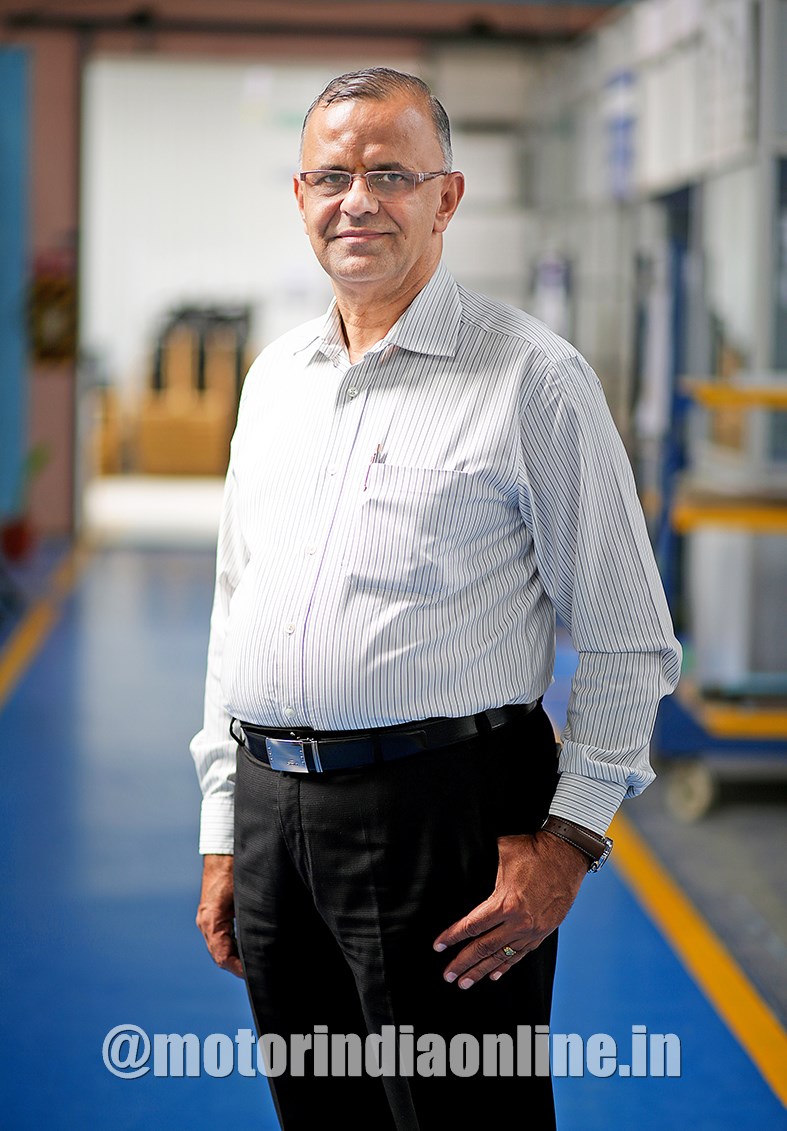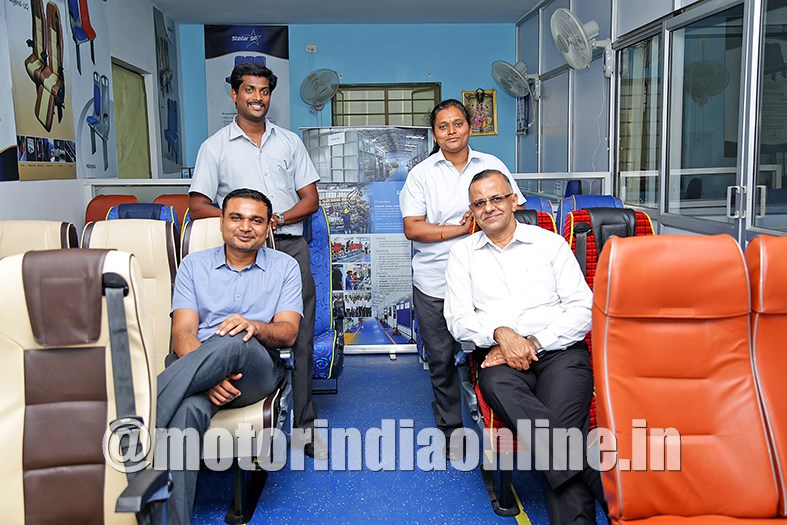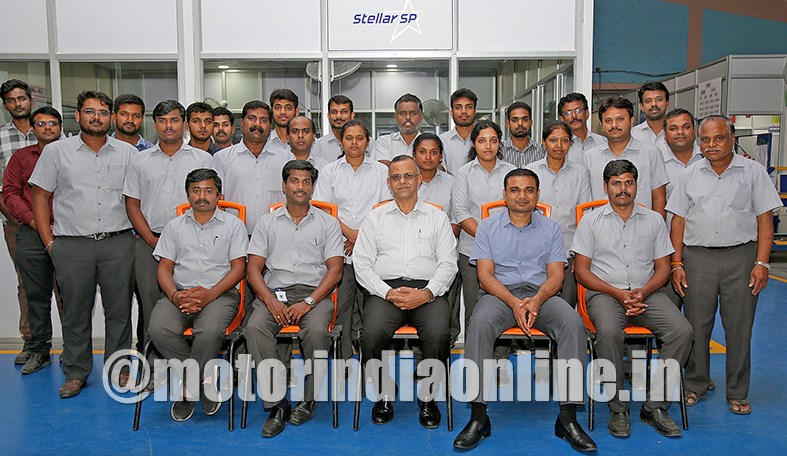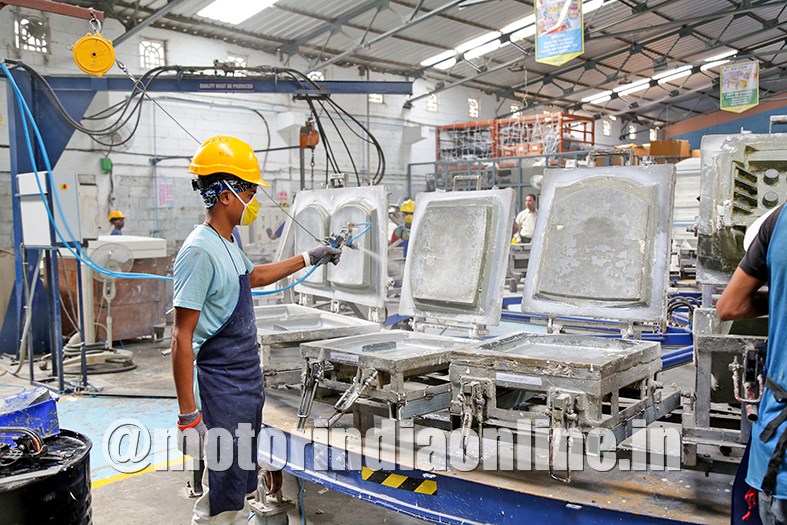Sarada Vishnubhatla visits the manufacturing set-up of Stellar SP, a start-up based in Attibele in Bangalore Urban district and finds it teeming with new and innovative ideas in modular and lightweight bus seating design that is ably supported by in-house research and development and engineering
Think bus seats, think Stellar Seats & Products (Stellar).
Stellar, an eight-month-old startup, is poised to unveil its modular and lightweight range of bus seats and aims to take on both domestic and international markets. This enthusiastic and lean company has many ideas up its sleeve and currently is in the process of setting up multiple efficiencies in its bid to expand its horizons.

Says Rengarajan Srinivasan, Director: “Stellar is looking at a multi-fold growth and we are already well-prepared. We are strategically located in Bangalore and are now focusing on modular design, light-weighting, new materials and in the near future we will be ready to make seats that we can assemble at the customer’s end.”
Pradeep Ambavaram, Director, adds: “Our philosophy is for all Stellar products to be nut and bolted ones. Though our flagship product will be bus seats, we will be also looking at other adjacencies, which can be built into profitable standalone verticals.”
A Stellar promise
Inspired by the ‘Make in India’ concept, Stellar is a start-up which means that it is a small company to begin with ‘where strings are held loosely’. Stellar’s advantage is its open-mindedness and its capability to execute projects fast. Says Ambavaram: “We are constantly working towards reducing the weight per se in all our engineered products. We are also lessening the number of components needed. Our latest new lightweight seat is under development. The prototype is ready and the product line will be launched in the beginning of 2020.” With the new product line, Stellar will be ready for markets across the country and the world, in line with its ‘Make in India, for India and the world’ strategy.
Stellar has already made successful inroads into new customers with well-designed seats, meeting the customer expectations on comfort, safety and trouble-free performance and reliability. Tamil Nadu is one such example which has received the well-engineered standard high back seats for mass public transport buses. Stellar has recently launched a new model ‘Sterling’, a reclining seat with 3-point safety belt and serviced it to new customers. The product has generated keen interest among the stakeholders who have placed repeat orders.
Ambavaram reveals: “Traditionally, the bodybuilders themselves build the seats along with the buses or source it locally from the unorganized sector. This is, probably, the first time that they have opted for outsourcing an engineered seat at competitive costs from Stellar and have realised that this product is far ahead of the curve because the end user has appreciated it. Leading bus body builders like SMK and PBC in Karnataka and trading agencies in Tamil Nadu, catering to STUs and institutional buses, are currently our biggest customers with around 75% of our seats business volume since our company’s inception few months ago. However, the business spread is widening with new customers coming on board.”

Going global
According to the company’s officials, modular design is a game-changer. Coupled with reforms in logistics, taxation and transport, Stellar is all set to reap benefits as a start-up.
Elaborating on the company’s strategy, Srinivasan says: “Light-weighting our seats to be at par with the world’s best seats is our objective. With CKD units, we can cut down on the logistics cost too, whether shipping within or outside the country. Also, Stellar is offering more than bus seats in the form of components, fabrication and PU foams. We are also looking at the commercial vehicle driver/operator seats segment. We will begin with fixed seats and progressively get into making suspension seats as well. We could also offer local manufacturing support to foreign firms looking at having a base in India; we are ready to tie up with them as contract manufacturers. They can bring the technology; we can source the components and assemble the seats to cater them. Then, as a step forward, we can also develop some of the components, and keep imports to a minimum.”
Adding to this, Ambavaram shares: “The world is evolving into a greener marketplace which means that it wants to save on fuel and cost. Our modular design is in exact alignment with this because it allows us to dismantle the seats, pack them in boxes and ship them. This way more bus seats can be sent at one go. Being light in weight, the shipment will offer better fuel efficiency. With GST implemented, cross-border trade has become less complicated. The cost of logistics has come down. We do not need to set up plants near our customers. Stellar is competitive in the domestic market and also globally. The structure and the internal components remain the same for both markets.”
“On the exterior, which is mainly the foaming part, we will have to modify our design to match the appetite of different geographies. For example, Europeans like slimmer seats while Indians prefer bulky ones,” Ambavaram adds.
Srinivasan points out: “Stellar is looking at opportunities for business expansion to the SAARC countries, ASEAN, Afro-middle east, Central Asia and Asia Pacific customers besides western and northern domestic markets. Nepal is a potential market from which we have received inquiries for bus seats. India is becoming an attractive sourcing base for these countries.”
Be it any preference, Stellar is ready to cater to these markets in a gradual yet steady manner. The recent good news for Stellar has been its tie-up with a commercial vehicle OEM with approval already in place. The company is approaching few more OEMs to initiate product development and sign business orders.

Exponential growth
A highly sensible start-up, Stellar is treading cautiously in the small but competitive vehicle seating segment domestically. It is looking at low and medium investment with medium and high volumes to trigger faster growth. With plans in the pipeline for setting up new verticals besides their flagship product, Stellar is fast emerging as a solution expert in seating and adjacencies.
“There are multiple business verticals but we believe in building multiple strengths. Our goal is to build fabrication, welding and foaming as strengths. We can go into precision fabrication that will open doors for us to get into defence and healthcare in the future. We are also looking at driver seats in buses and trucks, where the trucker’s seat needs to be more comfortable compared to the bus driver’s,” Ambavaram informs.
Adds Srinivasan: “We have set up a fixed seat assembly line that can produce 8 to 12 bus sets per shift. We are one line for reclining seats which can produce 6 bus sets per shift, while another is being newly laid that will add another 8 bus sets of different seat models per shift.”
Stellar is equipped with robust fabrication and foaming shops besides multiple welding lines. The start-up already has developed the capability to make fully-assembled ready-to-install sleeper foam berths.
Low cost and small automations
With strategically placed niche automated processes, Stellar is increasing their productivity per shift basis and turning out quality products with efficiency and high volumes per shift.
“We are now setting up only linear assembly lines which reduce human involvement and increase productivity. We are de-bottlenecking our processes by small automations. For example, we have devised a mechanical way to multi-drilling of the seat shells by just one machine. In welding, we are working on a semi-robotic rotary welding line. On this rotating line, the jigs are permanent which has drastically reduced the manpower required. Similarly, in foam, we have set up rotary conveyor. With this, we are able to load almost three times the capacity of a static line. Then, we have designed and implemented centralised gas manifold distribution system which distributes gas into the welding line. With this we are able to optimise and reduce gas consumption by almost 50-60%,” elaborates Srinivasan.
Stellar has been using low-cost small automations in the last six months and has witnessed better quality and productivity with zero rejections in foaming and welding lines.
De-skilling to enhance quality
In its short yet beneficial experience, Stellar has found de-skilling its workforce improving efficiency. The idea is to keep the workforce stress-free so that their mental fatigue will be less and quality will be a priority.
Srinivasan explains: “We are de-skilling every critical work process – be it in welding, foaming, sub or final assembly. We are bringing in extremely simple systems so that even an unskilled worker can do the job.”
“We have made our processes fool-proof. For instance, as long as a worker knows how to weld, he can work with us,” adds Ambavaram.
Stellar SP is now expanding its horizons to cater to EVs as well. With capacity additions, small automations, new product launches in the offing, the start-up is looking to rake up a storm in the bus seating segment.
